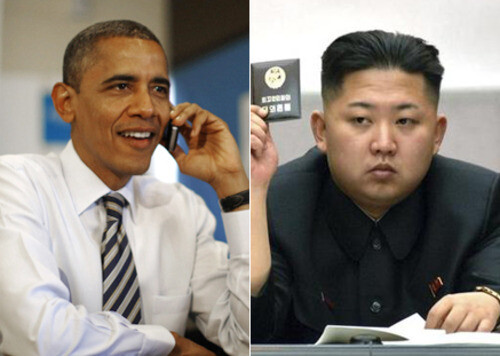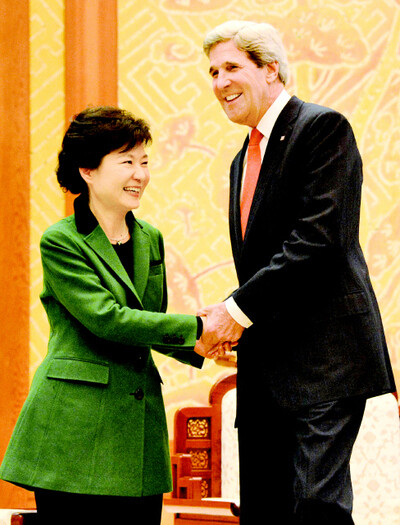hankyoreh
Links to other country sites 다른 나라 사이트 링크
How might North Korea respond to overtures for dialogue?

By Kang Tae-ho, senior staff writer and Kim Kyu-won, staff reporter
As US Secretary of State John Kerry began his visit to South Korea, China, and Japan on Apr. 12, there were signs that North Korea was adopting a more cautious stance about launching a missile. American TV news network CNN reported that North Korea had taken down the Musudan missile that had been positioned for launch on the east coast.
North Korea’s decision not to launch a missile on Apr. 12 suggests that things may change on the Korean peninsula.
Since on Apr. 11 when South Korean President Park Geun-hye was the first to make a point of indicating her willingness to engage in dialogue with North Korea, North Korea is in a position where it cannot easily ignore the offer.
As of the afternoon of Apr. 12, one full day since South Korean Unification Minister Ryoo Kihl-jae alluded to talks, North Korea had not made any official response. The mood in the North seems to one of thoughtful deliberation. After a foreign minister’s meeting with his South Korean counterpart Yun Byung-se, Kerry said, "Relations between the North and South can improve very quickly if leaders of the North, and one in particular, can make the right decisions”.
Remarks made by US President Barack Obama on Apr. 11 have also contributed substantially to the changing atmosphere. At a press conference held after a meeting with UN Secretary General Ban Ki-moon, Obama strongly urged North Korea to stop taking provocative action. “Nobody wants to see a conflict on the Korean Peninsula,” Obama said, promising to keep working to resolve the problem diplomatically.
This is only the second time that Obama has directly mentioned the issue on the Korean peninsula since North Korea conducted its third nuclear test in February, and it is the first time that he has specifically mentioned a diplomatic resolution. It appears that Obama was thinking of John Kerry’s Northeast Asia trip, which began on Apr. 12, when he spoke of a diplomatic solution. It is also highly likely that North Korea is waiting to see the outcome of the meeting between Kerry and South Korean foreign minister Yun Byung-se.
It is possible to see this as part of a gradual shift that the US government started to make at the beginning of this month. The most important part of the change is that the US is backing away from its official position that it no longer tolerates the cycle of North Korea making threats and provocations, creating a crisis, and transitioning to dialogue.
“When US Secretary of Defense Chuck Hagel decided on Apr. 5 to delay the launch-test of the new intercontinental ballistic missile Minuteman 3, it was stronger than any other message that could be made,” said a senior official in the South Korean government.
He made this decision despite the risk of being criticized for giving in to North Korean threats.
One way to view North Korea’s behavior recently during the time of heightened tensions is that it is asking the US to choose between dialogue and war. If North Korea pushes forward with a missile launch in the current situation, it will only extend the vicious cycle in which additional US-led UN sanctions are imposed on the North.
That decision would represent North Korea making a deliberate choice to close the door on the possibility of talks at the very moment that the US is trying to shift from military pressure to diplomacy. A cautious and deliberate decision is expected from North Korea.

Please direct questions or comments to [english@hani.co.kr]

Editorial・opinion
![[Column] Park Geun-hye déjà vu in Yoon Suk-yeol [Column] Park Geun-hye déjà vu in Yoon Suk-yeol](https://flexible.img.hani.co.kr/flexible/normal/500/300/imgdb/original/2024/0424/651713945113788.jpg) [Column] Park Geun-hye déjà vu in Yoon Suk-yeol
[Column] Park Geun-hye déjà vu in Yoon Suk-yeol![[Editorial] New weight of N. Korea’s nuclear threats makes dialogue all the more urgent [Editorial] New weight of N. Korea’s nuclear threats makes dialogue all the more urgent](https://flexible.img.hani.co.kr/flexible/normal/500/300/imgdb/original/2024/0424/7317139454662664.jpg) [Editorial] New weight of N. Korea’s nuclear threats makes dialogue all the more urgent
[Editorial] New weight of N. Korea’s nuclear threats makes dialogue all the more urgent- [Guest essay] The real reason Korea’s new right wants to dub Rhee a founding father
- [Column] ‘Choson’: Is it time we start referring to N. Korea in its own terms?
- [Editorial] Japan’s rewriting of history with Korea has gone too far
- [Column] The president’s questionable capacity for dialogue
- [Column] Are chaebol firms just pizza pies for families to divvy up as they please?
- [Column] Has Korea, too, crossed the Rubicon on China?
- [Correspondent’s column] In Japan’s alliance with US, echoes of its past alliances with UK
- [Editorial] Does Yoon think the Korean public is wrong?
Most viewed articles
- 1‘We must say no’: Seoul defense chief on Korean, USFK involvement in hypothetical Taiwan crisis
- 2N. Korean delegation’s trip to Iran shows how Pyongyang is leveraging ties with Moscow
- 3‘Weddingflation’ breaks the bank for Korean couples-to-be
- 4Korea sees more deaths than births for 52nd consecutive month in February
- 546% of cases of violence against women in Korea perpetrated by intimate partner, study finds
- 6[Column] Park Geun-hye déjà vu in Yoon Suk-yeol
- 7Will NewJeans end up collateral damage in internal feud at K-pop juggernaut Hybe?
- 8Amnesty notes ‘erosion’ of freedom of expression in Korea in annual human rights report
- 9[Editorial] New weight of N. Korea’s nuclear threats makes dialogue all the more urgent
- 10[Column] Yoon’s first 100 days should open our eyes to pitfalls of presidential system